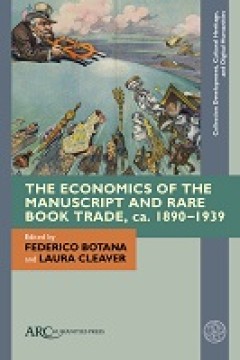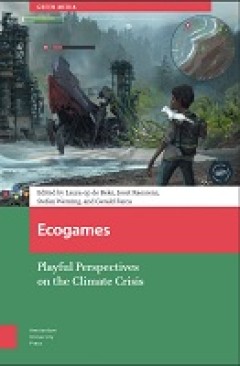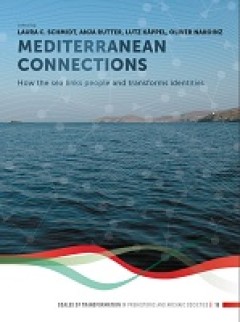Ditapis dengan

E-Book Make It Rain: State Control of the Atmosphere in Twentieth-Century Ame…
Weather control. Juxtaposing those two words is enough to raise eyebrows in a world where even the best weather models still fail to nail every forecast, and when the effects of climate change on sea level height, seasonal averages of weather phenomena, and biological behavior are being watched with interest by all, regardless of political or scientific persuasion. But between the late nineteen…
- Edisi
- -
- ISBN/ISSN
- 9780226437378
- Deskripsi Fisik
- 304 halaman
- Judul Seri
- -
- No. Panggil
- 551.6 HAR m

E-Book The Economics of the Manuscript and Rare Book Trade, ca. 1890–1939
The market for rare books has been characterized as unpredictable, and driven by the whims of a small number of rich individuals. Yet behind the headlines announcing new auction records, a range of sources make it possible to analyze the market as a whole. This book introduces the economics of the trade in manuscripts and rare books during the turbulent period ca. 1890–1939. It demonstrates h…
- Edisi
- -
- ISBN/ISSN
- 9781802700978
- Deskripsi Fisik
- 134 halaman
- Judul Seri
- -
- No. Panggil
- 091 BOT t

E-Book Ecogames
- Edisi
- -
- ISBN/ISSN
- 9789463721196
- Deskripsi Fisik
- 614 halaman
- Judul Seri
- -
- No. Panggil
- 577 BEK e
- Edisi
- -
- ISBN/ISSN
- 9789463721196
- Deskripsi Fisik
- 614 halaman
- Judul Seri
- -
- No. Panggil
- 577 BEK e

E-Book Mediterranean Connections: How the sea links people and transforms ide…
The present publication constitutes the Proceedings of Session 7 of the ‘Creation of landscapes VI’ workshop, hosted by the CAU Kiel in 2019. The session was entitled ‘Mediterranean Connections – how the sea links people and transforms identities’. With our focus on the linkage of people, this volume can be understood as a contribution to recent network research. But network research,…
- Edisi
- -
- ISBN/ISSN
- 9789464270693
- Deskripsi Fisik
- 238 halaman
- Judul Seri
- -
- No. Panggil
- 551.462 SCH m

E-Book Discourses, Dialogue and Diversity in Biographical Research: An Ecolog…
This book explores how narratives are deeply embodied, engaging heart, soul, as well as mind, through varying adult learner perspectives. Biographical research is not an isolated, individual, solipsistic endeavor but shaped by larger ecological interactions – in families, schools, universities, communities, societies, and networks – that can create or destroy hope. Telling or listening to l…
- Edisi
- -
- ISBN/ISSN
- 9789004465909
- Deskripsi Fisik
- 242 halaman
- Judul Seri
- -
- No. Panggil
- 577 BAI d

To Kill a Mockingbird
'Shoot all the bluejays you want, if you can hit 'em, but remember it's a sin to kill a mockingbird.' A lawyer's advice to his children as he defends the real mockingbird of Harper Lee's classic novel - a black man charged with the rape of a white girl. Through the young eyes of Scout and Jem Finch, Harper Lee explores with exuberant humour the irrationality of adult attitudes to race and clas…
- Edisi
- Cet. 1
- ISBN/ISSN
- 9780099549482
- Deskripsi Fisik
- 314 hlm; 11 x 18 cm
- Judul Seri
- -
- No. Panggil
- 823 LEE t
E-book The Validate Handbook : An Approach on the Integration of Values in Do…
To conclude, a central tenet of the VALIDATE approach is that HTA is a practice in which facts and values meet. To be able to address policy-related questions, HTA should not only provide information on the plausibility of claims on potential consequences of health technology, it should also assess the desirability of these consequences. This requires both an understanding of the te…
- Edisi
- -
- ISBN/ISSN
- 9789083178950
- Deskripsi Fisik
- 174 hlm
- Judul Seri
- -
- No. Panggil
- 610.28 OOR t

PANGAN, GIZI DAN PERTANIAN
- Edisi
- cet. 2
- ISBN/ISSN
- 979-8034-12-0
- Deskripsi Fisik
- viii; 258hlm;17 x 24cm
- Judul Seri
- -
- No. Panggil
- 641.3 HAR p
- Edisi
- cet. 2
- ISBN/ISSN
- 979-8034-12-0
- Deskripsi Fisik
- viii; 258hlm;17 x 24cm
- Judul Seri
- -
- No. Panggil
- 641.3 HAR p

PANGAN, GIZI DAN PERTANIAN
- Edisi
- cet. 2
- ISBN/ISSN
- 979-8034-12-0
- Deskripsi Fisik
- viii; 258hlm;17 x 24cm
- Judul Seri
- -
- No. Panggil
- 641.3 HAR p
- Edisi
- cet. 2
- ISBN/ISSN
- 979-8034-12-0
- Deskripsi Fisik
- viii; 258hlm;17 x 24cm
- Judul Seri
- -
- No. Panggil
- 641.3 HAR p

BUKU HARIAN SANG CALON PENGANTIN
- Edisi
- cet. 1
- ISBN/ISSN
- 979-22-0235-8
- Deskripsi Fisik
- 440 hlm;11 x 18 cm
- Judul Seri
- -
- No. Panggil
- 823 WOL b
- Edisi
- cet. 1
- ISBN/ISSN
- 979-22-0235-8
- Deskripsi Fisik
- 440 hlm;11 x 18 cm
- Judul Seri
- -
- No. Panggil
- 823 WOL b
 Karya Umum
Karya Umum  Filsafat
Filsafat  Agama
Agama  Ilmu-ilmu Sosial
Ilmu-ilmu Sosial  Bahasa
Bahasa  Ilmu-ilmu Murni
Ilmu-ilmu Murni  Ilmu-ilmu Terapan
Ilmu-ilmu Terapan  Kesenian, Hiburan, dan Olahraga
Kesenian, Hiburan, dan Olahraga  Kesusastraan
Kesusastraan  Geografi dan Sejarah
Geografi dan Sejarah